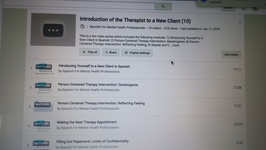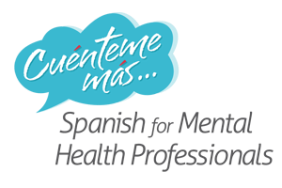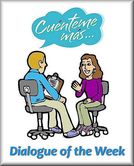by Alfonso M. López

We all know the important saying in Real Estate, Location, Location, Location!
When learning a language, we also have a very useful and important expression though maybe not always popular: Practice, Practice, Practice!
But realistically, it is sometimes difficult to find ways to practice your Spanish. Most of us would agree that during the actual session with your clients is not the ideal time and place to try new words, phrase constructions, and expressions!
We have a few suggestions for you to create fun, new habits which will painlessly help improve your Spanish.
Jennifer C. one of our most devoted students from beautiful San Diego, California shared with us recently some of her preferred techniques for practicing her Spanish on a regular basis.
Besides listening to videos and practicing with us in clinical role-play teleconferences, Jennifer makes it a habit to do the following daily:
- She listens to Spanish Radio Stations in her car on her way to work. (I know, sometimes even a native Spanish speaker can’t understand the fast talking individuals on the radio, but hey, for sure you’ll pick up words and expressions here and there; it helps, trust us).
For example, Cynthia B. is a fan of Spanish speaking radio psychologists Doctora Isabel and Doctor Edward Lopez Navarro. Cynthia always mentions that listening to them helps her tremendously with clinical vocabulary, cultural and legal issues facing the Latino community.
- Jennifer also watches Spanish speaking TV programs every time she has the time. (Hispanic Telenovelas, the counterpart of American soap operas, are ideal to practice Spanish, as the actors usually speak clearly and usually using a neutral accent).
- She reads magazines and articles in Spanish regularly.
- Jennifer also pushes herself to speak in Spanish when ordering food at restaurants or conversing with Spanish speaking people she encounters.
- One last thing Jennifer does to practice her Spanish regularly is to write small paragraphs of things that she frequently communicates to clients and then try to translate them to Spanish. (This technique can be very helpful, especially if it is done daily – write something short, perhaps five lines at a time, and translate it.)
You’ll be amazed at how useful these simple habits and techniques are for practicing your Spanish. Get on board!
As always, contact us! We are here to help mental health professionals improve their ability to treat Spanish speaking clients in their own language.
When learning a language, we also have a very useful and important expression though maybe not always popular: Practice, Practice, Practice!
But realistically, it is sometimes difficult to find ways to practice your Spanish. Most of us would agree that during the actual session with your clients is not the ideal time and place to try new words, phrase constructions, and expressions!
We have a few suggestions for you to create fun, new habits which will painlessly help improve your Spanish.
Jennifer C. one of our most devoted students from beautiful San Diego, California shared with us recently some of her preferred techniques for practicing her Spanish on a regular basis.
Besides listening to videos and practicing with us in clinical role-play teleconferences, Jennifer makes it a habit to do the following daily:
- She listens to Spanish Radio Stations in her car on her way to work. (I know, sometimes even a native Spanish speaker can’t understand the fast talking individuals on the radio, but hey, for sure you’ll pick up words and expressions here and there; it helps, trust us).
For example, Cynthia B. is a fan of Spanish speaking radio psychologists Doctora Isabel and Doctor Edward Lopez Navarro. Cynthia always mentions that listening to them helps her tremendously with clinical vocabulary, cultural and legal issues facing the Latino community.
- Jennifer also watches Spanish speaking TV programs every time she has the time. (Hispanic Telenovelas, the counterpart of American soap operas, are ideal to practice Spanish, as the actors usually speak clearly and usually using a neutral accent).
- She reads magazines and articles in Spanish regularly.
- Jennifer also pushes herself to speak in Spanish when ordering food at restaurants or conversing with Spanish speaking people she encounters.
- One last thing Jennifer does to practice her Spanish regularly is to write small paragraphs of things that she frequently communicates to clients and then try to translate them to Spanish. (This technique can be very helpful, especially if it is done daily – write something short, perhaps five lines at a time, and translate it.)
You’ll be amazed at how useful these simple habits and techniques are for practicing your Spanish. Get on board!
As always, contact us! We are here to help mental health professionals improve their ability to treat Spanish speaking clients in their own language.







 RSS Feed
RSS Feed



